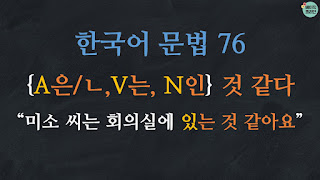Learn Korean | Korean Grammar 111: A/V-으면 안 되다/면 안 되다
In this lesson, we're going to learn 'A/V-으면 안 되다/면 안 되다'.
사진을 찍으면 안 돼요? – 네, 사진을 찍으면 안 됩니다.If you want to watch the lesson in Korean with English subtitles, please click the link below.
🎬 Korean Grammar 111: A/V-으면 안 되다/면 안 되다: https://youtu.be/l9GUr5aOQtg
1. A short conversation & Pronunciation
 |
| A/V-으면 안 되다/면 안 되다 |
(In the museum)
- 나나: 죄송한데, 여기에서 사진을 찍으면 안 돼요?
(Excuse me but am I not allowed to take a picture here?)
- 관리자: 네, 사진을 찍으면 안 됩니다. 미술관에서는 사진을 찍을 수 없습니다.
- 관리자: 네, 사진을 찍으면 안 됩니다. 미술관에서는 사진을 찍을 수 없습니다.
(No, you are not allowed to take a picture. You cannot take pictures at the museum.)
Here, the grammar we're going to learn today is '찍으면 안 돼요? and 찍으면 안됩니다'.
2. Usage
► 으면/면 (어미) + 안 (부정 부사) + 되다 (동사)
- It is a combination of the ending '으면/면', the negative adverb '안', and the verb '되다.'
► 1) If you use it in a 'question sentence,' you can use it when you ask the other person for permission. It has a similar meaning to 'adjective/verb-아도/어도/해도 되다'
► 2) If you use it in a 'declarative sentence', you can use it when you don't allow certain actions or states. It is used to prohibit something
3. Example Sentences
✎ 여기에서 사진을 찍으면 안 돼요? (찍다 + 으면 안 되다? → to ask permission)
(Can't I take a picture?)
– 네, 사진을 찍으면 안 됩니다. (찍다 + 으면 안 되다. → the action is not allowed)
(No, you should not take a picture)
✎ 밤에 전화하면 안 돼요? (전화하다 + 면 안 되다? → to ask permission)
(Can't I call you at night?)
- 네, 밤에 전화하면 안 돼요. (전화하다 + 면 안 되다. → the action is not allowed)
(No, you can't call at night.')
(No, you can't call at night.')
4. How to answer '-으면/면 안 되다?' (negative question)
✎ 사진을 찍으면 안 돼요?
(Can't I take a picture?)
1) Not Allowed: 네, 사진을 찍으면 안 돼요. (=네, 안 돼요.) (찍다 + 으면 안 되다)
(lit. Yes, you are not allowed to take a picture.)
(lit. Yes, you are not allowed to take a picture.)
2) Allowed: 아니요. 사진을 찍어도 돼요. (=아니요. 돼요.) (찍다 + 어도 되다)
(lit. No, you are allowed to take a picture.)
(lit. No, you are allowed to take a picture.)
5. Double negative expressions
(1) Using 안 negative expression, '안 A/V-으면/면 안 되다' is the combination of '안', adjective/verb and '–(으)면 안 되다'.
(2) Using '-지 않다', 'A/V-지 않으면 안 된다' is the combination of adjective/verb, '-지 않다' and '-으면 안 되다'.
→ They are used to emphasize the meaning of 'must do something'.
= (꼭/반드시=without fail, certainly) A/V-아야/어야/해야 되다
✎ 미소: 우리 이제 가야 돼요. (We have to go now.)
나나: 지금 안 가면 안 돼요? (=가지 않으면 안 돼요? → 꼭 가야 돼요?)
(Can't we not go now? which means 'Should we go now?)
미소: 네, 지금 안 가면 안 돼요. (=가지 않으면 안 돼요. 꼭 가야 돼요.)
(No, you can't go now. which means 'No, you should go now.')
지금 가지 않으면 늦을 거예요.
지금 가지 않으면 늦을 거예요.
(If we don't go now, we will be late.)
→ When negative expressions are used for '-(으)면 안 되다', it means 'you must do something.'
6. Combination Information
- It attaches after an adjective/a verb stem.
- When an adjective/verb stem has the final consonant, '-으면 안 되다' is used.
1) Final Consonant O : -으면 안 되다
- 찍다 (take) + 으면 안 되다 → 찍으면 안 되다
- 앉다 (sit) + 으면 안 되다 → 앉으면 안 되다
- 찍다 (take) + 으면 안 되다 → 찍으면 안 되다
- 앉다 (sit) + 으면 안 되다 → 앉으면 안 되다
-When an adjective/verb stem does not have the final consonant, '면 안 되다' is used.
2) Final Consonant X: -면 안 되다
- 가다 (go) + 면 안 되다 → 가면 안 되다
- 오다 (come) + 면 안 되다 → 오면 안 되다
- 가다 (go) + 면 안 되다 → 가면 안 되다
- 오다 (come) + 면 안 되다 → 오면 안 되다
-When an adjective/a verb stem ends with the final consonant ‘ㄹ’, add '-면 안 되다' even if there is a final consonant
3) Final Consonant ㄹ: (ㄹ drop) + -면 안 되다
- 만들다 (make) + 면 안 되다 → 만들면 안 되다
- 울다 (cry) + 면 안 되다 → 울면 안 되다
3) Final Consonant ㄹ: (ㄹ drop) + -면 안 되다
- 만들다 (make) + 면 안 되다 → 만들면 안 되다
- 울다 (cry) + 면 안 되다 → 울면 안 되다
7. Practice
✎ 저 먼저 집에 가면 안 돼요? (가다 + 면 안 되다?)
(Can't I go home first?)
✎ 여기에 앉으면 안 돼요. (앉다 + 으면 안 되다.)
(You can't sit here.)
✎ 수업 시간에 떠들면 안 돼요. (떠뜰다 + 면 안 되다)
(You can't talk in class.)
✎ 저 먼저 집에 가면 안 돼요? (가다 + 면 안 되다?)
(Can't I go home first?)
✎ 여기에 앉으면 안 돼요. (앉다 + 으면 안 되다.)
(You can't sit here.)
✎ 수업 시간에 떠들면 안 돼요. (떠뜰다 + 면 안 되다)
(You can't talk in class.)
 |
| A/V-으면 안 되다/면 안 되다 |
- 지안: 선생님, 한국어 시험을 볼 때 사전을 사용해도 돼요?
(Teacher, can I use the dictionary when taking the Korean test?)
- 선생님: 종이 사전은 사용해도 되지만, 핸드폰이나 전자 사전은 사용하면 안 돼요.
(You can use a paper dictionary, but not a mobile phone or electronic dictionary.)
(You can use a paper dictionary, but not a mobile phone or electronic dictionary.)
→ 사용하면 안 돼요. (사용하다 + 면 안 되다)
Thank you~!




_basickorean.jpg)

